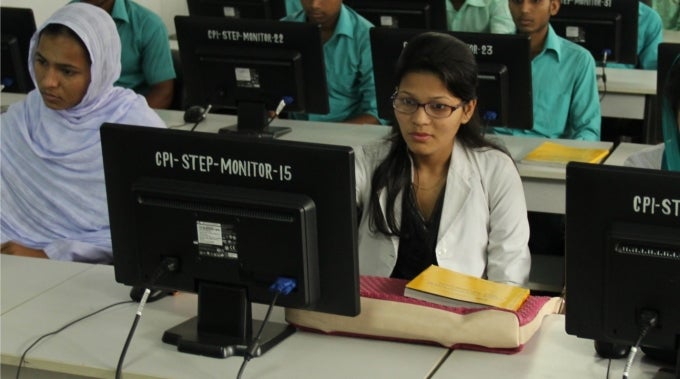
“I am proud today to have acquired technical skills to get an edge in a constantly changing global job market. In 2014, I was lucky to get the chance to participate in the skills competition organized by Skills and Training Enhancement Project (STEP). After a month of hard-work, I was the winner. This motivated and inspired me to pursue my future career. Technical skills helped me achieve personal and professional fulfilment,” said Jarin Tasnima, a student of Computer Engineering Department of the Dhaka Mohila Polytechnic.
Following the footsteps of students like Jarin Tasnima, Bithi, an architecture student is planning to participate in the next skills competition, scheduled for the end of 2015. She is the youngest member of a family of four and lacked the financial means to pay for her school.
Her brother, an accountant found out that having technical skills led to better pay and increased social respect. He motivated his younger sister to choose a technical career path in which she selected architecture. After achieving a secondary school certificate, her dreams came true due to a stipend program at the Dhaka Mohila Polytechnic supported by STEP which paid her fees. “I am thankful to my brother for advising me to join Polytechnic Institute to enhance my career,” said Bithi.
To provide an equitable opportunity for disadvantaged youth and female students to gain technical skills, the Government of Bangladesh introduced a poverty-targeted stipend through STEP in 2010 with the support from the World Bank and the Government of Canada.
As the market demand for skilled workforce increases daily, thousands of students like Jarin Tasnima and Bithi, from every part of Bangladesh are enrolling in Technical and Vocational Education and Training (TVET) institutes to become skilled workers.
Currently, a total of 118,000 students get stipend support based on need. Monitoring data indicates that the demand for post-secondary TVET has increased 7-fold and now attract a wider variety of students, including those who excel academically. Female enrollment increased from 5% to 25%; overall enrollment increased from 55% to 98% of available seats; and the drop-out rate dramatically decreased from 20% to 2%.
Improving the quality, relevance as well as ensuring access and equity in the TVET sector is gradually increasing employability of the graduates at home and abroad with special focus on reducing poverty and improving the quality of life for the majority of the population. Improving the availability and quality of TVET training plays a key role in attaining stability and dignity.


Join the Conversation